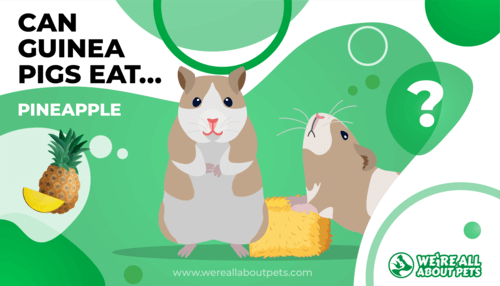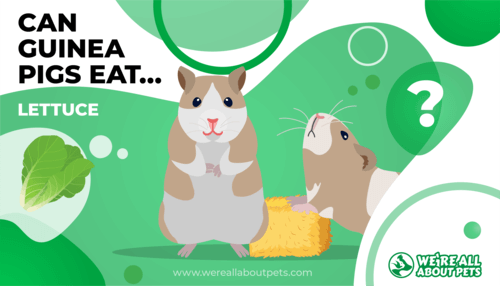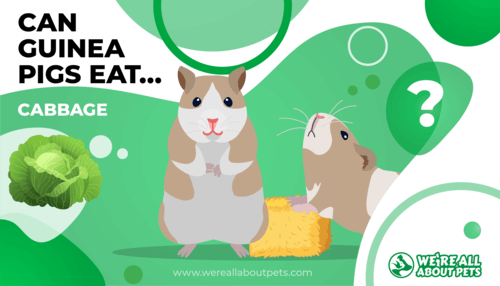Can Guinea Pigs Eat Blackberries?
This page contains affiliate links. We may earn money or products from the companies mentioned in this post through our independently chosen links, which earn us a commission. Learn More
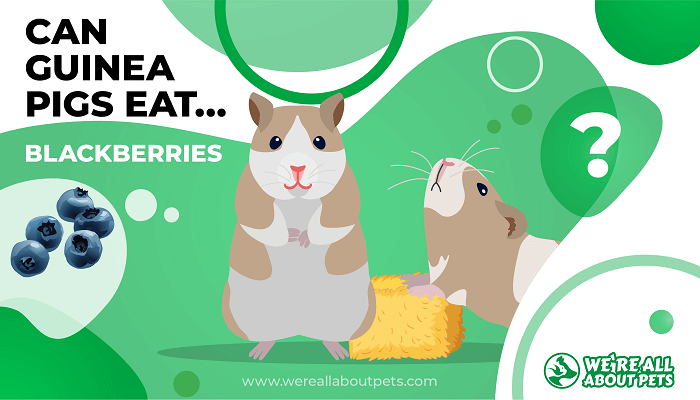
Maybe you’ve been to the farmer’s market or found a patch of ripe blackberries growing wild. Maybe you’ve just harvested a bumper crop from your own bushes! Whatever the case may be, having lots of blackberries is a cause for celebration – and it’s only natural to share!
You’ve got questions, though. Are blackberries OK for guinea pigs? If so, how many blackberries can a guinea pig eat, and how often can they enjoy this special treat?
We’re here with answers. First off, the most important one: Yes! Guinea pigs can have blackberries, but only in moderation.
Stick around for a few minutes and we’ll help you learn everything there is to know about blackberries for guinea pigs.
Blackberries Nutrition Stats
You can tell that blackberries are loaded with antioxidants thanks to their deep, dark purple color. Despite offering lots of nutrition, blackberries are surprisingly low in calories. Just one more reason they’re a favorite!
In a one-cup serving of ripe, juicy blackberries, you’ll get about:
- 62 calories
- 7 g carbohydrates
- 6 g fiber
- 2 g protein
- .7 g fat
Blackberries Nutritional Facts
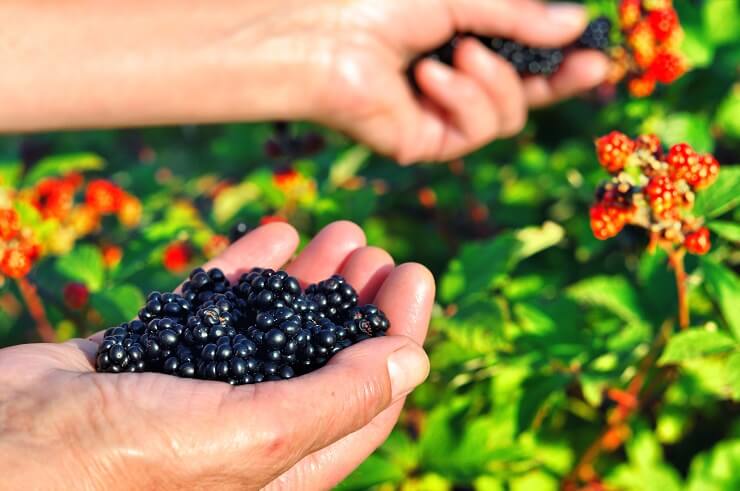
Blackberries are an excellent source of vitamin C, which is something that you and your guinea pig need!
That same one-cup serving offers approximately:
- 308 iu vitamin A
- 233 mg potassium
- 2 mg vitamin C
- 5 mcg vitamin K
- 36 mcg folate
- .9 mg manganese
- 8 mg magnesium
- 2 mg choline
- .4 mg pantothenic acid
- .2 mg copper
- 7 mg phosphorus
- 8 mg calcium
Can Guinea Pigs Have Blackberries?
Absolutely! Blackberries are a delicious, all-natural guinea pig treat. They’re higher in sugar than the foods that make up a guinea pig’s natural diet though, so you’ll need to portion them out carefully.
Are Blackberries Good For Guinea Pigs?
Fun fact, and something you might already know: Guinea pigs don’t make their own vitamin C. It’s a trait they share with us humans and a few other animals, and it means that supplementation is important.
Of course, your guinea pig’s food should contain all the vitamin C they need but a little extra certainly doesn’t hurt.
As it turns out, blackberries are a great source of vitamin C, which is essential for your cavy’s good health. The fiber, vitamin A, and other nutrients are helpful, too!
Do Guinea Pigs Like Blackberries?
We’re confident when we say that almost all guinea pigs love blackberries! In fact, we’ve never met a guinea pig that didn’t like these scrumptious little fruits.
How Many Blackberries Can A Guinea Pig Eat?
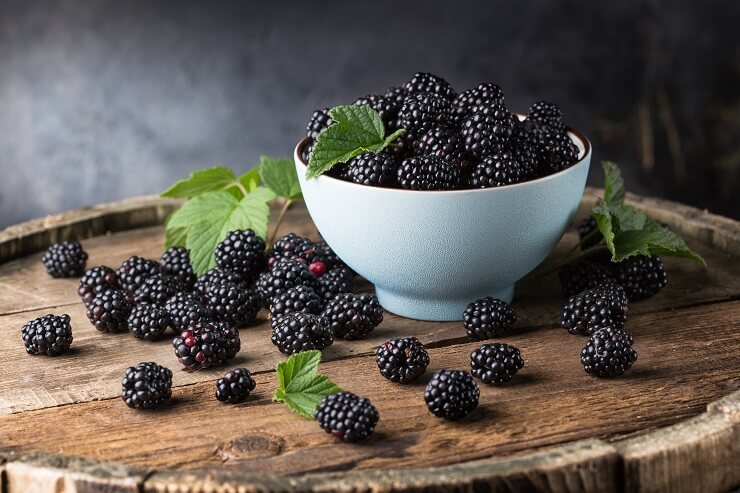
That’s a great question! Here’s how much blackberry to feed your guinea pig:
| Age | Amount |
| Baby guinea pig | None |
| Adult guinea pig | 3 small blackberries or 2 large blackberries |
While that may not sound like a lot to you, it’s a pretty big treat for your guinea pig. In fact, if your cavy is on the small side, you might want to offer even less than this. After all, it’s best to be careful when it comes to sweet treats.
Once your piggie enjoys their first nibble, they’re likely to ask for more.
Don’t give in! Even though blackberries are good for cavies, too many might throw your guinea pig’s delicate digestive system out of balance.
If your guinea pig is already accustomed to sweet treats such as strawberries, blueberries, and watermelon, then you can offer them a complete portion of blackberries and let them enjoy.
In case this is their first time having anything sweet, offer just one small berry the first time. Spend the next several hours watching for any sign of an upset tummy or diarrhea. Neither of these is likely – but they’re problems that can happen!
So long as everything is normal, you can gradually increase your guinea pig’s blackberry serving size until they’re eating the full amount.
How Often Can A Guinea Pig Eat Blackberries?
It’s best to give your guinea pig blackberries no more than two or three times per week – and never on the same day as you offer another sweet treat including high-sugar veggies such as carrots.
Blackberries are relatively high in sugar, and they’re super-juicy, which is a sign that they’re full of water. If you offer too much, too often, your guinea pig is at risk of developing diarrhea – it’s something that can happen with any high-water food.
Sugar complicates things too. If your cavy eats too many sweet snacks, they’re at risk of developing obesity and diabetes over time. Just remember to let your piggie have berries and other fruits in moderation!
The Correct Diet Is Important
A guinea pig’s natural diet is very simple. For the most part, wild cavies graze on grasses and other low-lying vegetation. You want to offer mostly fresh hay to simulate your pet’s natural diet. Give them enough to eat plus a couple of extra handfuls that they can use for nesting and tunneling, plus occasional nibbles.
Besides hay, here’s what else to feed your guinea pig:
- Guinea pig pellets with vitamin C (Check the label to find the correct serving amount)
- About one cup of fresh vegetables daily, divided into 2 or 3 smaller meals if possible; rotate different leafy greens and crunchy veggies every day to reduce the risk of kidney stones caused by excessive oxalic acid intake
- Clean, fresh water is essential so be sure to rinse and refill your guinea pig’s water bottle at least once every day
What Are Other Healthy Alternatives To Blackberries In A Guinea Pig’s Diet?
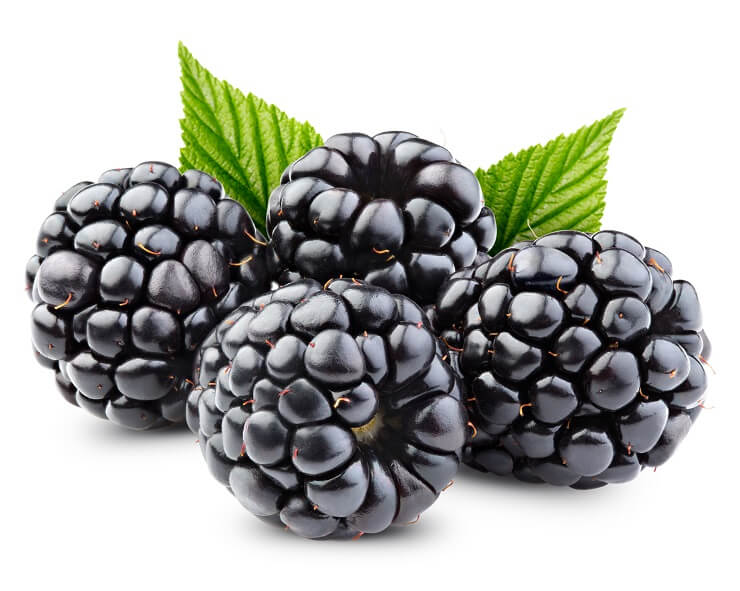
Guinea pigs like fruits and vegetables of all kinds, so it’s easy to find a variety of healthy treats!
Next time you’re shopping for veggies to share with your guinea pig, consider:
- green beans
- artichoke
- parsley
- basil
- beets
- beet tops
- cilantro
- carrot
- carrot tops
- romaine
- mint
- arugula
- swiss chard
- cabbage
- sweet potato
- butter lettuce
- cucumber
- buttercrunch lettuce
- bibb lettuce
- escarole
- rocket
- spinach
- bell pepper
- endive
- parsnip
- zucchini
- summer squash
- pumpkin
- winter squash
- tomato
- bok choy
- asparagus
- yu choy
- broccolini
- broccoli
- brussels sprouts
- cauliflower
- watercress
The odds are good that if you like a certain vegetable, your cavy will like it too! At the same time, be sure to check for information on every new addition to your guinea pig’s diet.
This is the best way to avoid toxic foods for guinea pigs, plus it’s the easiest way to find out how much of each item your pet can safely enjoy.
It’s time for some whisker wiggles and squeaks of appreciation: Giving your guinea pig blackberries is a great way to show that you care while adding a bit of nutrition and yummy flavor to their day!
Frequently Asked Questions
Are blackberries safe for guinea pigs?
Yes, just remember to stick to the recommended amount and your guinea pig can safely enjoy blackberries as a treat.
Can blackberries make my guinea pig sick?
Yes, but it isn’t likely. Just like other sweet foods, blackberries can cause diarrhea and give your guinea pig an upset tummy if eaten in excess.
That’s not all. If your guinea pig eats too many blackberries and other sweet foods too often, then they’re at a higher risk of developing diabetes and obesity. These conditions affect your guinea pig’s ability to live comfortably plus they can shorten your pet’s life span.
Can guinea pigs eat blackberry leaves?
Yes, so long as you wash the blackberry leaves well and make sure that they’re fresh. It’s best to only offer organic blackberry leaves since the conventionally grown variety might have traces of chemical herbicides or pesticides on them. If you have access to wild blackberries and you know that the bushes haven’t been chemically treated, you can safely give your guinea pig a few of those leaves.






